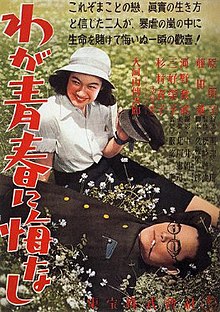No Regrets for Our Youth
| No Regrets for Our Youth | |
|---|---|
 |
|
| Directed by | Akira Kurosawa |
| Produced by | Keiji Matsuzaki |
| Written by |
Eijirō Hisaita Akira Kurosawa Keiji Matsuzaki |
| Starring |
Setsuko Hara Susumu Fujita Denjirō Ōkōchi |
| Music by | Tadashi Hattori |
| Cinematography | Asakazu Nakai |
| Edited by | Akira Kurosawa |
|
Production
company |
|
| Distributed by | Toho Company Ltd. |
|
Release date
|
|
|
Running time
|
110 minutes |
| Country | Japan |
| Language | Japanese |
No Regrets for Our Youth (わが青春に悔なし Waga seishun ni kuinashi?, aka No Regrets for My Youth) is a 1946 film written and directed by Akira Kurosawa. It is based on the Takigawa incident of 1933.
The film stars Setsuko Hara, Susumu Fujita, Takashi Shimura and Denjirō Ōkōchi. Fujita's character was inspired by the real-life Hotsumi Ozaki, who assisted the famous Soviet spy Richard Sorge and so became the only Japanese citizen to suffer the death penalty for treason during World War Two. The film is in black-and-white and runs 110 minutes.
The film begins in 1933. Students at Kyoto Imperial University protest against the Japanese invasion of Manchuria. Prominent professor Yagihara (Denjiro Okochi) is relieved of his post because of his leftist views against fascism. The professor's daughter Yukie (Setsuko Hara) is courted by two of her father's students: Ryukichi Noge (Susumu Fujita) and Itokawa (Akitake Kôno). Itokawa is safe and sensible while Noge is fiery. Yukie is eventually drawn toward Noge.
Noge disappears following an anti-militarist student protest. His disappearance is the result of being arrested and he spends four years in jail. By the time Itokawa (now a prosecutor for the government) tells Yukie about Noge's whereabouts he has already been out of jail for a year. He also tells her that he is a changed man, that he is no longer how Yukie remembered him.
Itokawa brings Noge over to the Yagihara residence. During dinner, Professor Yagihara mentions that Noge wouldn't have gotten out unless the government was convinced that Noge had "converted" from his radical ways. Noge confirms this and says that Itokawa vouched for him and had even found him a job in the army.
...
Wikipedia
